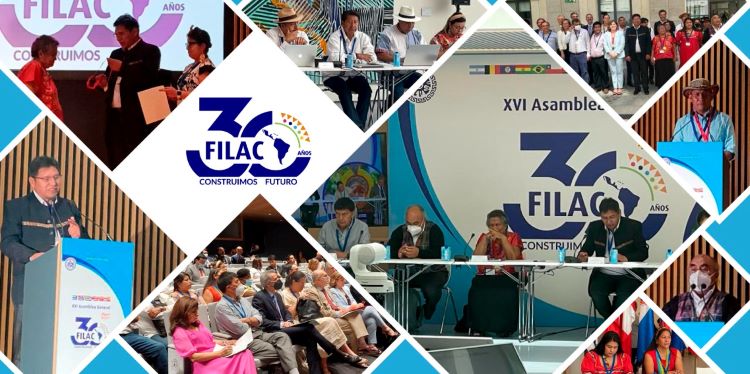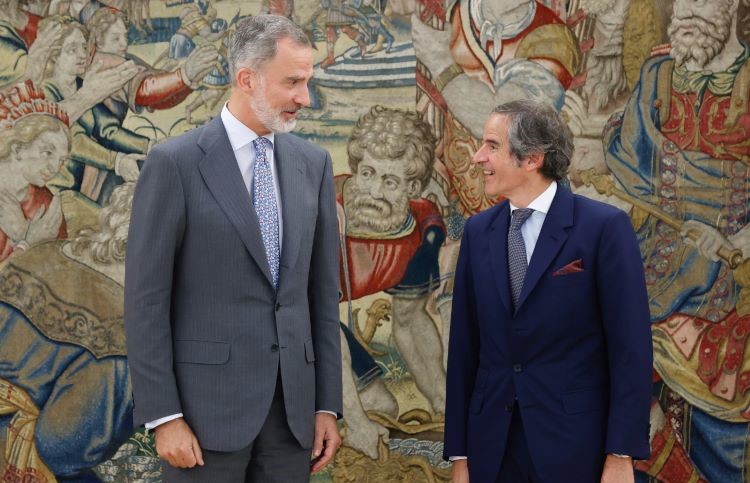The Diplomat
The XVI General Assembly of the Fund for the Development of Indigenous Peoples of Latin America and the Caribbean (FILAC) yesterday called for the “full and effective” participation of indigenous peoples in matters that affect them, including “consultation and prior free and informed consent” of the communities affected by any mining, hydrocarbon or hydroelectric projects.
The Assembly, which met on July 21 and 22 at the headquarters of the Ministry of Foreign Affairs in the Plaza de Marqués de Santillana, concluded yesterday with the approval of a Madrid Declaration that renews the “commitment to the Ibero-American Plan of Action for the Implementation of the Rights of Indigenous Peoples” and commemorates “that July 24, 2022 will mark the 30th anniversary of the signing of the Agreement Establishing the Fund,” which took place during the second Ibero-American Summit of Heads of State and Government, held in Spain in 1992.
Among its numerous agreements, the Declaration urges to “strengthen mechanisms for the full and effective participation of Indigenous Peoples with a human rights approach and in harmony with the diversity of their own worldviews and cultures, in the construction, implementation and monitoring of national plans to achieve the objectives of the 2030 Agenda for Sustainable Development”, to “strengthen the permanent mechanisms for dialogue and consultation of Indigenous Peoples, through their own organizational forms” and to guarantee both “adequate procedures of free, prior and informed consent and “the full and effective participation of indigenous women and youth in the generation of public policies that should address issues of special interest to Indigenous Peoples, including the rights to their lands, territories and natural resources”.
These points imply, as explained at the final press conference by the president of FILAC and vice-chancellor of the Plurinational State of Bolivia, Freddy Mamani, the “full and effective participation” of indigenous peoples in matters that affect them, such as the right to land or natural resources, and, therefore, “consultation and prior free and informed consent” of the affected communities before the implementation of any mining, hydrocarbon or hydroelectric project. Behind all this, he added, is the exercise of “the self-determination of indigenous peoples, something that is recognized in the United Nations declaration on the rights of indigenous peoples”.
The Declaration calls for “the necessary measures” to protect indigenous women, children, adolescents and youth “against all forms of violence and discrimination” and to “ensure the restitution of their rights” and urges national authorities, in consultation with Indigenous Peoples, to take the necessary measures to strengthen statistical information from censuses, continuous surveys and other methodologies, “disaggregating the data so that they respond to the multicultural composition of societies”.
The text encourages international organizations, agencies and cooperation funds to “support the financing strategy of FILAC’s flagship programs” and highlights “the beginning of the activities of the International Decade of Indigenous Languages 2022-2032, which aims to draw attention to the serious loss of indigenous languages and the urgent need to take effective action to preserve, revitalize and promote them”.
The Declaration calls for “national and global measures to address the scourge of racism, racial discrimination, xenophobia, hate speech, sexism, stigmatization and various manifestations of violence, which the HIV/AIDS pandemic has exacerbated”, and expresses its concern for “the persistence of actions, often violent, that limit or impede the exercise of individual and collective rights of the leaders of Indigenous Peoples in the defense of their rights, including the struggles for their lands, territories and natural resources”.
The XXVIII Ibero-American Summit
The Declaration and the evaluation report in its final draft incorporating the suggestions made at the Assembly will be sent, during the next few days, for the consideration of the XXVIII Ibero-American Summit of Heads of State and Government, to be held in the Dominican Republic, “in order to strengthen the follow-up of the Ibero-American Plan of Action for the Implementation of the Rights of Indigenous Peoples”.
At the final press conference, the Director of AECID, Antón Leis, defined this conference as an opportunity to reiterate “Spain’s deep and firm commitment to the protection and promotion of the rights of indigenous peoples and to sustainable development” and stressed the importance of indigenous peoples for sustainable development, since, although they represent 10% of the continent’s population, they face greater challenges than the population as a whole, such as 14% of poverty.
During the first day of the Assembly, an incident occurred when a former employee of Brazil’s National Indian Foundation (FUNAI) began to angrily rebuke the president of this foundation, Marcelo Augusto Xavier da Silva, whom he accused of the murders of the Brazilian indigenist Bruno Pereira and the British journalist Dom Phillips.
An official from the Ministry of Foreign Affairs called the Brazilian Embassy to inquire about what had happened and to find out about the relationship with the person who provoked the incident, sources from the department headed by José Manuel Albares told The Diplomat. For their part, embassy sources expressed surprise at the presence of this person at the meeting.
Marcelo Augusto Xavier da Silva, as announced in a FUNAI communiqué, filed a complaint with the Spanish judicial police against the person who insulted him, for a crime against honour and for moral damages.






